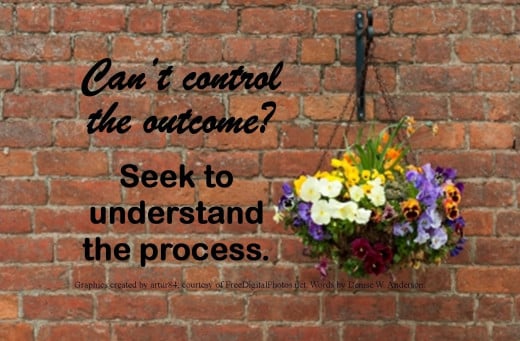When a Child Says "I Hate You!"

"I hate you!" the little girl shouted as her mother tried to coax her into leaving the activity being provided by the parenting class. The mother's bowed head and stooped shoulders were evidence that this was not the first time her daughter had lashed out at her.
The father walked away from his son's home with the words, "I hate you!" ringing in his ears. Only minutes before, they had shared their holiday meal in peace and serenity. How could this have happened?
"I don't know what to do!" the mother said to me in exasperation. Her daughter had shouted "I hate you!" just minutes before. "What am I doing wrong? I am trying to teach her correctly!"
When a child's needs are not being met, a feeling of mistrust develops. Left unchecked, it wells up into an angry outburst of hate. When we are pelted with the venom of hate, our automatic reaction is to recoil and strike back. We feel hurt, betrayed, and angry, and want to protect our own self-interests. We think of all that we have given and done for the benefit of the child, and now we are being rejected.
In an effort to control the outcome of the situation, we raise our voices and threaten punishment. We use our adult authority to belittle and demand, letting the child know that it is wrong to hate, and that they have no right to use that word. Before we know what has happened, we have turned our backs on the child, withholding the very thing that they are in need of most, our unconditional love.
But whoso shall offend one of these little ones which believe in me, it were better for him that a millstone were hanged about his neck, and that he were drowned in the depth of the sea.
— KJV Matthew 18:6Have you ever had a child say "I hate you?"
This type of problem does not go away by itself. We have to do something in order to keep our relationship with the child from being lost in a battle of words and the heat of emotion. The following approach is helpful:
- Stop and breathe
- Reflect and listen
- Affirm with love
Read the paragraphs below for insight into how this works:
1. Stop and breathe
All behavior is motivated by need. Something has happened with the child that is not readily evident. The word weapons being thrown at this moment have been launched in self-defense. The child is hurting. There is unspoken fear and anger.
Hate is a strong emotion. It is a wall set up to protect our delicate feelings of self-worth that are in danger of being annihilated. The only way to keep this from happening is to push away those who are most intimate to us. Without them close by, they have no more power to cause us hurt. We surround ourselves with a shell that protects us from any more danger.
It takes a great deal of courage, strength, determination, and tenacity for a parent to stop at this critical moment. More importantly, it takes faith. We have to believe that there is a better way, that the delicate balance of our relationship with the child depends upon our ability to withhold punishment.
Stopping interrupts the exchange of power and preserves the relationship. Should we go forward at this moment, we destroy whatever trust we have built. Our ability to stop allows both us and the child to think about what is occurring and regroup for the problem-solving process.
Deep breathing slows the heart and clears the head. It gives us something to do while we are waiting for our brain to catch up with our body. It also makes us pause momentarily and regroup. We know that physically hurting the child is wrong. Spanking does not cure hatred, neither does yelling and screaming.
Our most important objective is to solve the presenting problem, not control the feelings of the child. The child has been thinking about the problem long enough that assumptions have been made. These may or may not be true, but they are there, and must be dealt with accordingly.

2. Reflect and listen
In order for us to gain an understanding of what is happening, we need to become a mirror, reflecting back to the child what we see and hear. Rather than reacting, we simply re-state what we hear them say or think that they are feeling. It might go something like this:
Parent: You hate me.
Child: Yes! You said that you would take me to the store and you didn't!
Parent: You are angry with me because I did not take you to the store.
Child: Yes! I needed to get some treats for my school class. Now it is time to go to bed, and I don't have any treats! The teacher will be mad at me, and so will all the kids! I can't go to school tomorrow!
Parent: You are upset because you don't have any treats to take to school tomorrow.
Child: Yes! I hate you!
Parent: I see. I promised to do something for you and didn't do it, now you do not like me anymore.
Child: Yes! Go away!
Now that the matter is out in the open. We can work on resolution of the problem. It may take some effort, both for us, and for the child. Most likely, the answer is not an easy one. We have to backtrack and find the root of the problem. This may mean putting ourselves out in ways that we did not previously anticipate.
We also need to be wary of the child's negative behavior. If we regularly have this situation happening, responding with understanding when they have an angry outburst, they will get the idea that is how to get our attention. It is far better to be sensitive to the needs of our children in advance.
At the present moment, it is necessary to work together on a compromise that requires action on the part of the child, as well as on us. That way, we work to rebuild the unconditional love that was temporarily lost. Our ability to listen determines how much of what our child is saying that we really hear.
The incident may have been precipitated by a single action, or a series of events that happened over time. When we pause to listen, we allow the child to express their feelings. We keep them talking until we agree on an understanding. We may have to set aside our own agenda long enough to engage the child in a dialogue.

3. Affirm with love
Once we have come to a mutual understanding with each other, there is an emptiness that needs to be filled. We are both aching in our souls, and feel that we have been hurt and betrayed. In order to bridge this gap and re-build the trust that is needed, we express unconditional love. This can be done by:
- Hugging or embracing
- Giving a kiss
- Speaking in soft, loving tones
- Affirming the worth of the individual
We affirm each other's worth by saying words that indicate we expect each other for who we are, and not what we have done. Saying, "I love you," "You are important to me," "I'm glad that you are my child," or "Sit with me, I want to be close to you."
Unconditional love is shown through kindness, affection, and soft spoken words. Given freely and regularly, it helps our family members know that they are an important part of our family. Teaching and disciplining have much greater staying power when they are implemented in an environment of love and acceptance.
"Speak Life" by Toby Mack reminds us that we all experience times when we feel that our needs are not met, and something happens that makes us lash out at another person. The important thing to remember, is that we don't have to continue feeling this way. As we look for the good in others, speaking words that bring life, building each other up, we are much more able to work through the disappointments and heartache that are a normal part of our lives.
*Poem Daily Comfort written by Denise W. Anderson.
Daily Comfort*
“Do you love me?” I asked with hesitation, “Sometimes I just don’t know.”
“Of course I love you!” he said with a sigh, “I thought that I did show. I washed and I scrubbed and I worked today, and I brought you the last’s month’s take home pay.”
“Yes, you did, and I thank you so much, but the comfort I need is your loving touch, your smile and your words of ‘I love you.’ Then I’ll know that you love me as much as you do.”
He put his arms ‘round me and lovingly said, “I love you more than the roses are red, more than the sky and ocean are blue, more than you ever know I’ll be true.”
“Thank you indeed for the words so kind, I guess you think that I am blind. I see all the things that you daily do, but I just need to hear that ‘I love you.’ It brings me a warmth that envelops my soul and makes me feel that I am whole.”
“If that’s all it takes to help you feel good, than I’ll say it daily along with my food that you fix me for my evening meal. I’ll be generous with praise, since that’s how you feel.”
“Please do not give it with the evening meal, that’s the time of day when I feel like a heel. I’ve worked real hard and I am a bit stressed, the children are around and I just feel pressed.”
“Then I’ll give it to you in the room at night, when we have just turned out the light. We’ll take our time and relax a bit, and then I’ll disclose the whole of it.”
“I need it then, but I’ve come to see, that in the morning I need you to be loving and kind with a goodbye kiss, for when you are gone I surely do miss. So all through the day I will remember when you loved me, and I will feel good again.”
*Poem "Daily Comfort" by Denise W. Anderson.
© 2015 Denise W Anderson








